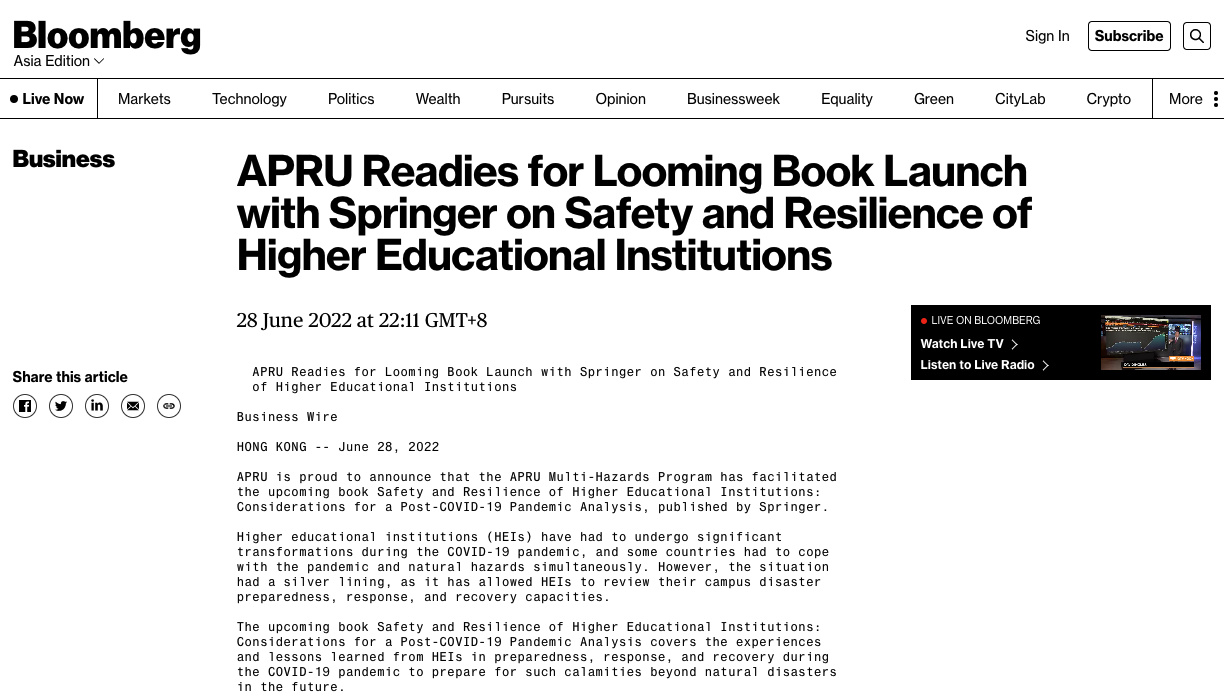Congratulations to the sixteen APRU scholars across seven universities alongside external partners and experts contributing to this book, sharing interdisciplinary knowledge and experiences that higher educational institutions can lead in the midst of disaster risk management, natural and biological hazards, and COVID-19 pandemic.
Original post on Bloomberg.
APRU is proud to announce that the APRU Multi-Hazards Program has facilitated the upcoming book Safety and Resilience of Higher Educational Institutions: Considerations for a Post-COVID-19 Pandemic Analysis, published by Springer.
Higher educational institutions (HEIs) have had to undergo significant transformations during the COVID-19 pandemic, and some countries had to cope with the pandemic and natural hazards simultaneously. However, the situation had a silver lining, as it has allowed HEIs to review their campus disaster preparedness, response, and recovery capacities.
The upcoming book Safety and Resilience of Higher Educational Institutions: Considerations for a Post-COVID-19 Pandemic Analysis covers the experiences and lessons learned from HEIs in preparedness, response, and recovery during the COVID-19 pandemic to prepare for such calamities beyond natural disasters in the future.
The book has been edited by Takako Izumi, Associate Professor of IRIDeS, Tohoku University, Japan, and Director of APRU Multi-Hazards (MH) Program; Indrajit Pal, Associate Professor, Asian Institute of Technology, Thailand; and Rajib Shaw, Professor of Graduate School of Media and Governance, Keio University, Japan.
Izumi’s chapter includes a checklist for university preparedness developed under the APRU MH campus safety program. A survey was conducted based on the checklist to assess the current preparedness capacities on campus and identify their challenges to minimize damage from future hazards.
“The survey result showed that not many universities conducted even a general risk assessment on campus. It is strongly recommended that universities review their current disaster management plans with proper risk assessment and improve them to be applicable to a wider range of risks,” Izumi said.
A chapter co-written by Dr. Mellissa Withers, Associate Professor at the University of Southern California and Director of the APRU Global Health Program, and Elly Vandegrift, Director of Global STEM Education Initiatives in the Global Studies Institute at the University of Oregon, contains fifteen case studies from universities in Canada, Mexico, and the U.S., finding that faculty learned to create online community environments and meaningful assessment and assignment systems. At the same time, students responded to new offerings to participate in global cross-cultural and cross-country event programs. The authors described how the APRU Virtual Student Exchange Program facilitated immersive structural exchange connecting students with peers abroad in projects ranging from exploring the Galapagos islands to picturing Hong Kong through historical paintings and photos.
“Although many of these innovations were born out of necessity, they have certainly set the stage for post-pandemic higher education in the future,” Withers said in a webinar held on May 24 in preparation for the launch.
In the same webinar, Dr. Pan Tsung-Yi, Associate Research Fellow at the Center for Weather Climate and Disaster Research, National Taiwan University (NTU), presented an overview of the Taiwanese government’s epidemic prevention in the higher education system. Pan explained how NTU swiftly developed a digital learning platform for non-contact teaching while creating a low-cost automated temperature measuring device with a contract tracing system for face-to-face learning by describing the universities’ role. The system successfully handled 26,000 visits to the NTU campus daily, involving 80,000 daily ID card scans to avoid Covid-19 cluster-spreading between the different campus buildings.
“Through the sharing of the Taiwan experience, we hope institutions can refer to it to enhance campus safety and resilience for the future,” Pan said.
Dr. Ailsa Holloway, a Senior Lecturer in Public Health at Auckland University of Technology, explained that New Zealand’s Covid-19 responses were based on the national risk context of past measles outbreaks, volcanic eruptions, Australian bushfires, and earthquakes.
“We learned that higher education governance systems that systematically incorporate disaster risk considerations are better placed for vigorous and coherent emergency response,” Holloway said.
“Universities are vital in the frontline response to public health and other emergencies, while also being vulnerable, both externally with respect to exposures outside the institution and internally with respect to students, staff, and the operating system,” she added.
Information about the book Safety and Resilience of Higher Educational Institutions:
https://link.springer.com/book/10.1007/978-981-19-1193-4
More on APRU Multi-Hazards Program:
http://aprumh.irides.tohoku.ac.jp/
https://apru.org/our-work/pacific-rim-challenges/multi-hazards/
About APRU
As a network of 60 leading universities linking the Americas, Asia, and Australasia, APRU brings together thought leaders, researchers, and policy-makers to exchange ideas and collaborate on practical solutions to the challenges of the 21st century. They leverage their members’ collective education and research capabilities into the international public policy process. In the post-pandemic era, their strategic priorities focus on providing a neutral platform for high-level policy dialogue, taking actions on climate change, and supporting diversity, inclusion, and minorities. APRU’s primary activities support these strategic priorities with a focus on critical areas such as disaster risk reduction, women in leadership, indigenous knowledge, virtual student exchange, esports, population aging, global health, sustainable cities, artificial intelligence, waste management, and more.
To learn more about APRU, please visit www.apru.org
Contacts
Media:
Jack Ng
Director, Communications, APRU
Email: [email protected]

